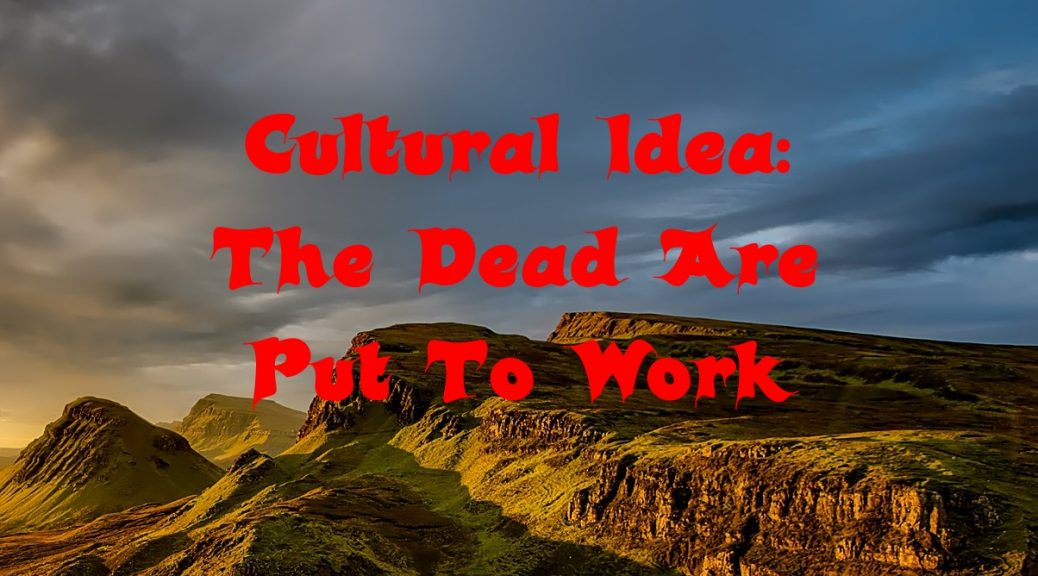I have an area in my campaign world that is yet to be visited by player characters, so I haven’t worked out all the details. The area is a place with high plateaus, more like mesas, that are isolated and self-contained places for those who live atop them. Islands, isolated valleys, or deep caverns could also be the locale.
It occurred to me that not all plateaus will be large and spacious, and that fertile land for crops is at a premium. Perhaps fuel for large fires, such as for cremation is also limited. How would they dispose of the dead, if not by burial? I imagined that the rock is tough and takes a lot of effort that one does not desire to waste it on the dead.
Whether they are a dwindling group in need of workers, or an overcrowded living space where everyone must do their part, even in death.
Whether it is their religion and the priests raise the undead after the conclusion of the funeral ceremonies, if there are such, or wizards in service to the state. The end result is a loyal workforce who unquestioningly do the most back breaking and dangerous tasks.
To avoid both odor and the unpleasant possibility of seeing a loved one in a state of decay, skeletons are the preferred type of undead. To prevent them from getting in the way, they can hang from the rooftops or the edges of the cliffs atop the mesa.
What might the undead do?
- Backbreaking labor, like digging into the rock to make more living space for the populace.
- Guard the most dangerous approaches from which predators, monsters, or raiders might attempt to attack.
- Serve as the bulk of the military.
- Serve as the body guard for the monarch, oligarchs, or other ruling elite. (Enough armor and cloaks can hide their true nature.)
- Perform as beasts of burden for moving goods or pulling plows. (Perhaps they turn over the soil with shovels and hoes, or their hands.)
Socio Economic Effects
Essentially enslaving the bodies of the dead until they wear our or are destroyed through accident or battle will elevate the lot of the poorest among them. The wisest among them will live healthy lives to lengthen their years, the foolish will die at a younger age. Those who object to eternal undeath might attempt to flee. By using undead to do all the most menial and dangerous jobs, what might that do to the populace? Will they be degenerate and fall into sloth, leading to a decline in their numbers? Will they use the time to focus on improving their society and both skilled craft and art receive a greater stature? Will there be less crime? Will all have enough?
Aren’t They Evil?
If they aren’t going around killing people to make their undead slaves, then they aren’t necessarily evil. If their religion understands that the vital essence or spirit leaves the body and what remains is just a framework from which the society will benefit. If their religion only calls for this out of necessity for preservation of their ways, and only accepts new undead from the ranks of the group’s recent dead, then most likely, not evil.
An evil twist might be that due to the predations of raiders or ravaging monsters or a battle they lost has left them short of troops. “Lost travelers” might be intercepted by patrols and volunteered into the “skeleton corps.” Only strangers would be targeted. Merchants bring needed supplies they can’t get any other way. Not being fools, they will ensure to learn that no one will miss them, and interrogate them to learn what the prisoners know that might be useful, before inducting them into the undead.
Evil Versions:
If they are an evil cult, they will gladly take all lost travelers in and make them part of their undying servants. How might word of this group get out to warn those who border them?
It might not be an evil cult, it might be a powerful necromancer who is the only one strong enough to keep them safe from warring neighbors, raiders, or monsters, and the populace just goes along with it. So the evil is the silence of those who benefit from it, while the necromancer delves into more ingenious ways to use the dead to serve their means.
How Obvious Is It?
Some might relegate the undead laborers to only work at night, so the populace doesn’t have to look on them. In this case, the undead could be zombies.
Visitors to the plateaus might not see the silent servants, whether they are hidden by natural or magical means. Are they invisible?
How are they Controlled?
Rather than have the priests or wizards guiding their undead creations about, they will develop amulets or other devices to allow overseers to coordinate groups of undead. Ranked devices will allow more control and coordination of groups to common tasks. This will expand the ability to maintain control of the undead and prevent rival clerics or wizards from wresting control of them easily.
Other Ideas:
I’m interested in other ideas, how might a culture use undead that are not necessarily evil?
Listen to the companion podcast episode here.


